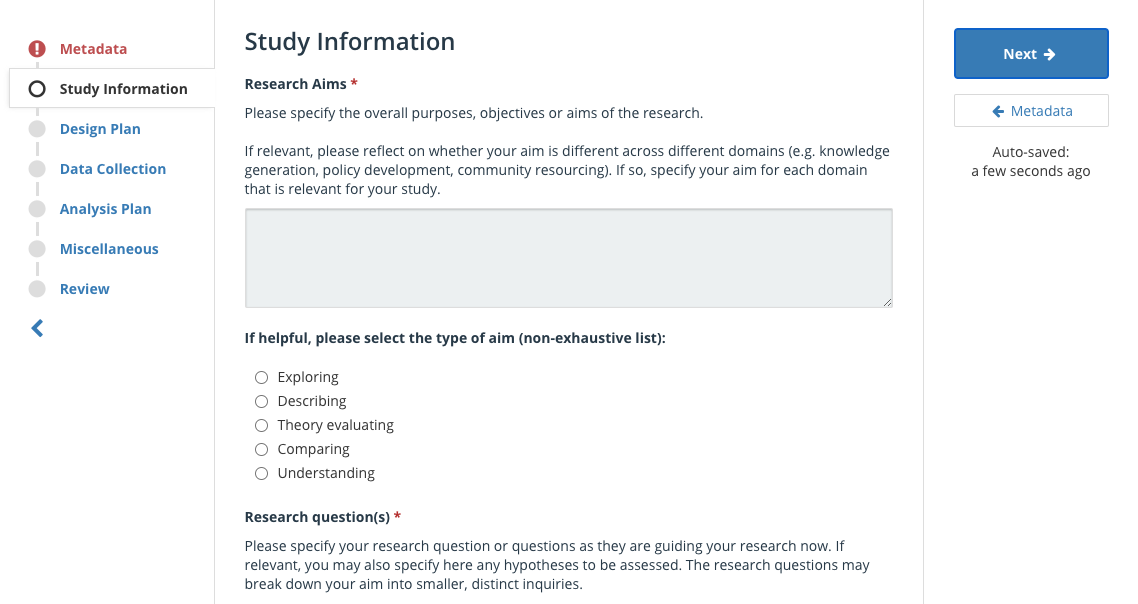
Against the backdrop of an alleged reproducibility crisis and awareness of researcher misbehavior, the practice of preregistration is enjoying increasing popularity — especially among quantitative researchers. Preregistration makes visible what was hypothesized before an analysis, which findings were in line with those hypotheses, and which weren’t. Yet, in the broader debate on Open Science and transparency in research, would a practice similar to preregistration be useful for qualitative research, too? Given the findings a qualitative analysis reports, what portion of those did the scholars bring to the study in the form of their prior beliefs and expectations, and which aspects of a study’s findings drew on — and which diverged from — those beliefs or expectations? In a recent collaborative effort published in the International Journal of Qualitative Research Methods with an interdisciplinary group of researchers, we set out to explore how preregistration could look like for qualitative research.
Making hypotheses explicit is only one feature of preregistration, and for those who engage in hypothesis-testing qualitative work, the benefit might be evident. One of the main dilemmas that qualitative researchers confront is that this type of research is oftentimes conceived as essentially inductive. In this vein, preregistration is perceived as useless and impossible to perform. However, inductive research does not start from a theoretical void. Preregistration simply establishes a formal beginning to the iteration between fieldwork and theory development; a systematic, transparent version of a research log.
Preregistration not only can improve research transparency but it can improve theory development. Moreover, preregistration also helps researchers to think carefully about their fieldwork. Far from reducing the space for creativity and discovery, thinking systematically about the theoretical framing of the initial empirical steps improves creativity and widens opportunities for discovery. Finally, having a template to preregister qualitative studies serves as a checklist to guide this process.
The key difference with a research log is that the preregistration can be found on an open platform, here the OSF. This enables others to join the discussion, and is an early way to show the world what ideas you’re working on, without being afraid of those ideas being stolen as you can demonstrate you have been working on them from a particular point in time. Of course, if that would hamper the goals of your research, you can embargo your preregistration for up to four years — only releasing it when you send your work off for peer review or when you are in some other way ready to share it with the world.
As qualitative researchers, we rely on iteration and flexibility — a too narrow application of preregistration may look like a straight jacket for qualitative inference. But with this flexibility also comes responsibility to carefully map the decisions we made in response to certain findings and new information uncovered. We do not map this for others to replicate our interpretations to the letter, but to understand and follow our course of interpretation. Reflecting on this raises the question of what it is needed to know about a study’s design, or in other words: what would qualitative researchers find helpful and informative in elements of a preregistration template?
This led us, in collaboration with other colleagues, to conduct a Delphi study among qualitative researchers, instructors and methodologists. A Delphi is a research design that uses (online) questionnaires and feedback reports to let participating experts converge on an opinion. It is a popular consensus tool, and is especially helpful for topics where yielding another form of empirical evidence would be difficult (Delphi’s are popular for Guidelines or checklist development).
The qualitative preregistration template produced, grounded in agreement among our participating panelists, is now available on OSF. It is a possible tool for those who see value in making their work more open and transparent, and is an important additional step for qualitative researchers to participate in the dialogue about Open Science, Open Research or Open Scholarship. In essence, preregistration brings qualitative research closer to the principles of the OSF. In turn, it will help practitioners conceive of qualitative research and its production of knowledge as a collective enterprise. This is the common ground for increasing collaboration between researchers. For example, researchers will be able to learn about research strategies and problems from prior or concurrent studies and to replicate other studies to gain external validity.
The template is only one step forward in the direction of greater research transparency. Going forward, the challenge is for qualitative researchers to incorporate this practice in their research routines and to test-run and expand the newly developed preregistration tool, to find out where preregistration can improve qualitative research.
View a live demonstration of the OSF qualitative preregistration template here.

6218 Georgia Avenue NW, Suite #1, Unit 3189
Washington, DC 20011
Email: contact@cos.io

Unless otherwise noted, this site is licensed under a Creative Commons Attribution 4.0 International (CC BY 4.0) License.
Responsible stewards of your support
COS has earned top recognition from Charity Navigator and Candid (formerly GuideStar) for our financial transparency and accountability to our mission. COS and the OSF were also awarded SOC2 accreditation in 2023 after an independent assessment of our security and procedures by the American Institute of CPAs (AICPA).
We invite all of our sponsors, partners, and members of the community to learn more about how our organization operates, our impact, our financial performance, and our nonprofit status.